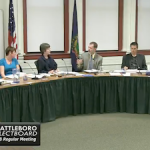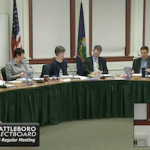Selectboard Meeting Notes – Solid Waste and Parking Budgets Approved, Homelessness and Energy Discussed
Groundworks Collaborative gave the Brattleboro Selectboard a report on the seasonal overflow shelter. They admitted they don’t have the resources to develop a temporary work program, though a new effort by Youth Services might be able to pull it off, perhaps by fall. Youth Services might get a new name, too, but that’s for another time.
The board adopted the FY19 Solid Waste and Parking Budgets, but left some decisions about parking meters, apps, and credit cards for a later discussion. Progress on energy audit matters was detailed, citizens pressed for more to be done, the skatepark is close to the fundraising finish line, grants have been applied for, and citizens were appointed to various Brattleboro committees and boards.
Also, two mentions of John Allen.









